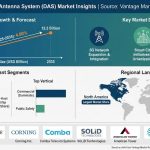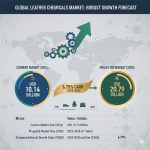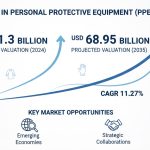Global Pharmaceutical Manufacturing Market
As stated in our extensive report, the Global Pharmaceutical Manufacturing Market accounted for USD 510.5 Billion in 2022 and is projected to reach a value of USD 863.6 Billion by 2030.
Pharmaceutical Manufacturing refers to producing numerous pharmaceutical products, such as medications, drugs, and healthcare products. This process involves several stages that ensure the final product’s quality, safety, and efficacy. The global Pharmaceutical Manufacturing market is a critical sector of the healthcare industry, responsible for producing and distributing essential medicines that save millions of lives worldwide. With the rising demand for medication and technological advancements, the Pharmaceutical Manufacturing market has been experiencing significant growth and is likely to continue escalating in the coming years.
One of the key reasons behind the growth of the global Pharmaceutical Manufacturing market is the rise in chronic and infectious diseases. With the aging population and changing lifestyles, there has been an increase in the prevalence of diseases such as diabetes, cancer, and cardiovascular diseases. This has created a high demand for medications, leading to augmented production by pharmaceutical manufacturers. Another factor propelling the Pharmaceutical Manufacturing market growth is the rise in investment in research and development (R&D) activities. Pharmaceutical companies invest in R&D to develop innovative drugs and therapies to address various health conditions. This has led to the introduction of novel drugs in the market, advancing Pharmaceutical Manufacturing.
Click To Get a Free Sample On the Research Study

Key Factors Influencing Global Pharmaceutical Manufacturing Market Growth
The growth of the global Pharmaceutical Manufacturing market can be attributable to the following:
- Increasing demand for pharmaceutical products: The growing global population, along with the occurrence of chronic diseases and the need for new and innovative therapies, is boosting the need for pharmaceutical products at the global level. This is a key factor influencing the growth of the Pharmaceutical Manufacturing market.
- Technological advancements: Advancements in technology, like automation and robotics, are improving the efficiency and productivity of Pharmaceutical Manufacturing processes. This helps reduce production time and costs, leading to increased growth in the market.
- Regulatory environment: Regulatory bodies are crucial in the Pharmaceutical Manufacturing market. Stringent regulations and quality standards imposed by regulatory authorities ensure the safety and efficacy of pharmaceutical products. Compliance with such regulations is a key factor influencing market development.
- Increasing outsourcing of manufacturing activities: Many pharmaceutical companies outsource their manufacturing activities to contract manufacturing organizations (CMOs) to reduce costs and focus on core competencies. This trend propels the Pharmaceutical Manufacturing market growth as CMOs expand their manufacturing capacities to meet the demand.
- Increasing focus on personalized medicine: The growing emphasis on personalized medicine, which involves tailoring treatment to individual patients based on their genetic makeup, propels the need for specialized pharmaceutical products. This is driving the expansion of the Pharmaceutical Manufacturing market as companies develop manufacturing capabilities to produce personalized therapies.
- Growing importance of generics and biosimilars: The growing cost of healthcare and the expiration of patents for many branded drugs drive the demand for generic and biosimilar products. The manufacturing of these products offers cost savings for patients and healthcare systems, leading to increased market growth.
North America Region to Express the Largest Market Growth
The North America market is accounted to have the most significant market growth in 2022 with a 42.3% revenue share. This can be attributed to several factors. The increase in chronic diseases like cancer, cardiovascular diseases, and diabetes drives North America demand for pharmaceutical products. The aging population, unhealthy lifestyles, and sedentary behaviors are contributing to the rising incidence of these conditions, creating a need for more pharmaceutical treatments. Moreover, technological advancements and pharmaceutical research are also fuelling market growth. The pharmaceutical industry constantly innovates and develops new drugs, therapies, and treatment options. This includes the development of personalized medicine and biopharmaceuticals tailored to individual patients, which has been made possible by advancements in genomic sequencing and precision medicine. Additionally, favorable government policies and regulations support the growth of the North America Pharmaceutical Manufacturing market. Governments are providing funding and incentives for research & development and streamlining regulatory processes to encourage drug development and manufacturing.
Conclusion
In conclusion, the global Pharmaceutical Manufacturing market is experiencing significant growth due to various factors. The increase in demand for pharmaceutical products, driven by the rise in chronic and infectious diseases, is a key factor influencing market growth. Technological advancements in automation and robotics are also improving efficiency in the manufacturing processes. Additionally, the regulatory environment and the increasing outsourcing of manufacturing activities influence market development. The growth in focus on personalized medicine and the importance of generics and biosimilars are further driving the expansion of the Pharmaceutical Manufacturing market.
Some of the key players in the Global Pharmaceutical Manufacturing Market include – F. Hoffmann-La Roche Ltd. (Switzerland), Novartis AG (Switzerland), GlaxoSmithKline PLC (UK), Pfizer Inc. (U.S.), Merck & Co. Inc. (U.S.), AstraZeneca (UK), Johnson & Johnson (U.S.), Sanofi SA (France), Eli Lilly and Company (U.S.), AbbVie Inc. (U.S.), Thermo Fisher Scientific Inc. (U.S.), Wuxi Apptec (China), Samsung Biologics (South Korea) and others.
![[Market Research Reports] – Research Google News Blog | VMR.Biz](https://www.vmr.biz/wp-content/uploads/2022/12/logo-removebg-preview.png)











